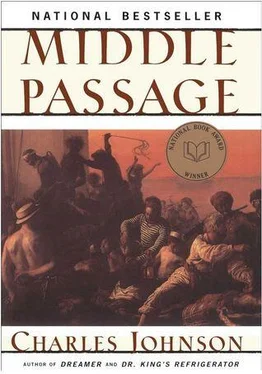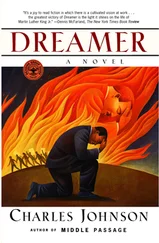Past the barbican to the broad piazza of the receiving house, Ahman-de-Bellah, a froglike, vast-bearded Arab who was notorious for drawing out the brains of his enemies with an iron hook, herded the Allmuseri to stand before Bogha and Captain Falcon, who met Bellah with the cracking-fingers greeting of the coast. There, off to one side of the trees, his people put up their tents, then forced the Allmuseri toward the warehouses.
“Poor bastards,” said Cringle, seeing me squeezing my fists and unable to swallow. “Their villages were destroyed by famine.” He banged his large calabash pipe on the Bible he carried, bound in pressed pigskin, to shake loose the dottle. “Ahman-de-Bellah took them without a fight. Their rivers dried up. The drought’s lasted a decade, I believe, which means they’ll never survive the voyage back, if that’s what you’re wondering. The skipper won’t find three in ten healthy enough to spend two months in the hold. Better,” said he, “to be dead in a ditch than in their shoes.”
“Peter, what’s happening on ship?”
“How do you mean?”
“The captain, he gave me a talk I cannot untangle. He asks me to help him—”
The mate shook his head two, three times. “Stay away from him, Rutherford. He’s mad”—Cringle touched two fingers to his left temple—“and if you hope to see New Orleans again, the best thing is to separate yourself from Falcon now.” The muscles around his eyes knotted. “He will sink this ship and take us with him. He doesn’t want to return. Did you know that? That’s why he goes to sea. Haven’t you noticed how nothing is ever right for him? How even when he jokes, it is a jeering kind of humor? No one knows this, but he’s been married thirty years and he still plays with himself. His wife, Molly, a beldam if ever there was one, makes him wash his hands and dingus before they fornicate. She picks her nose when they make love, she’s that bored. Little wonder he doesn’t want to return to her. When she is angry, I hear, she sews all his clothing together. In their wedding portrait, which I have seen, she is thin enough to be a model for El Greco. Now she’s dumpled enough to pose for Peter Paul Rubens. And that’s the least of his complaints about life. He is vain. And therefore self-pitying. And vicious, lad. He keeps a list of personal affronts, insults and abuses he’s received, or believes he’s received, and dates them — he reviews them when he’s drunk, keeps them alive, and always watches for a man’s weaknesses once he’s signed on. He knows mine is Tommy, that I cannot stand his treatment of the boy.” Cringle stood pitched forward as if in a stiff wind, a habit he’d formed at sea. “Out there, on the ocean, in Africa, or during some ’adventure,’ he hopes something will do for him what he cannot do himself.”
“Then you’re saying we won’t get home?”
“Not with what he’s bringing aboard.”
“The Allmuseri?”
“No,” said Cringle, “the other thing. .”
“What?”
“I don’t know what it is! It has no name. All I know is that it belongs to the Allmuseri and has no business in our world.” He looked away, out toward the distant ships whose dactyloid masts favored a dark stretch of winter trees on the water, then away again. Ever since we’d come ashore he had been twitchy as a squirrel. So tense any clock he came close to ran, by my reckoning, forty seconds faster. “Are you with me and the few of our chaps who stand against him?”
“I guess, I don’t know—”
“Decide soon,” he said. “Falcon has friends here, but we will act as soon as we put out to sea.”
Then he was off, called away by Captain Falcon to help in the hellish work of inspecting the cavity-ridden teeth, shaved skulls, and stippled privates of four men for whom the skipper paid 100 bars each (a bar being worth half a dollar, a pound of powder, or a fathom of ordinary cloth); then the women over twenty-five (Bellah gave Falcon a 25 percent reduction on these); and finally the children who, like trout, had to measure four feet four inches or they would be thrown back into the bush. And Falcon was furious. Ahman-de-Bellah had passed at least one doctored black off on him, an old man medicated with some unknown drug that bloated his skin. He oozed oniony-smelling sweat from powder treatments. When Falcon pressed a finger against his teeth, bubbles of pus oozed from the man’s gums. Lemon juice had been swabbed along his body to give it a glossy appearance, but it made no difference. He died, delirious, before Falcon could get his money back. The captain, of course, was no paragon of honesty. The cotton bales he used for barter were hollow at their centers, the whiskey carefully watered down, and the gunpowder was of an inferior stock. Captain Falcon grew edgy, I guess, that this deceit might be discovered, and kept us busy most of the night transferring his cargo from the boats to the ship’s belly. In his “rough” log (the one a ship’s master edited to produce a more polished book for his employers), which I would see later, he wrote:
3,500 hides
$1,750;
19 large and prime ivory teeth
1,560
Gold
2,500
600 pounds of small ivory
320
15 tons of rice
600
40 slaves
1,600
36 bullocks
360
Sheep, goats, vegetables, butter
100
900 lbs beeswax
95
Total caravan value
$8,885
The skipper’s share or “lay” of the profits was a handsome 25 percent of the take. The crew received a pitiful twelve dollars per month, a thing increasingly offensive to most hands when talk of Falcon’s mysterious find — loaded last of all onto the ship in a crate big enough to carry a bull elephant, its price omitted from his log — moved, like an electric shock, from one mate to another. Added to which, and perhaps worst of all, our ship’s carpenters grumbled of water in the frowzy hold. Once the Allmuseri saw the great ship and the squalid pit that would house them sardined belly-to-buttocks in the orlop, with its dead air and razor-teethed bilge rats, each slave forced to lie spoon-fashion on his left side to relieve the pressure against his heart-after seeing this, the Africans panicked. Believe it or not, a barker told us they thought we were barbarians shipping them to America to be eaten. They saw us as savages. In their mythology Europeans had once been members of their tribe — rulers, even, for a time — but fell into what was for these people the blackest of sins. The failure to experience the unity of Being everywhere was the Allmuseri vision of Hell. And that was where we lived: purgatory. That was where we were taking them — into the madness of multiplicity — and the thought of it drove them wild. A one-handed Allmuseri thief attacked Cringle with a belaying pin and was shot by the mate. (I should explain that lopping off a thief’s right hand was this tribe’s punishment for stealing, because the Allmuseri ate with their right hands and wiped their arses with their left; by depriving this man of his right hand, they forced him into the indignity of eating and scraping off excrement with the selfsame limb.) A woman pitched her baby overboard into the waters below us. At least two men tried to follow, straining against their chains, and this sudden flurry of resistance brought out the worst in Falcon, if you can imagine that. He beat them until blood came. The male slaves he double-ironed, removing the ladder to the hold and lowering them by ropes so none could climb back up. Women he had sleep in the cabins, young children were jummixed on deck in the longboats beneath sheets of tarpaulin, and if any Negro even looked as if he was thinking of rebellion, that man was to be birched and taught the sting of noose and yardarm.
Читать дальше












